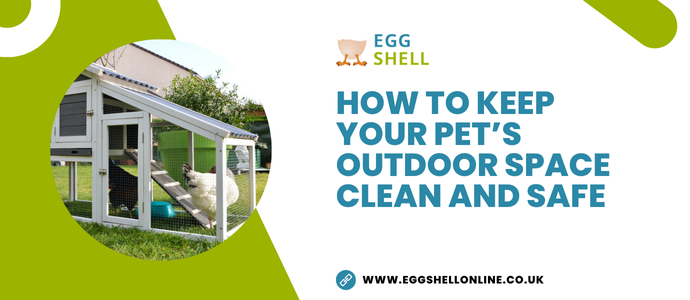Your pets will thrive best when they have access to the outdoors, but keeping them safe will naturally be a concern for pet owners. From toxic plants to environmental threats like foxes, there’s no shortage of dangers lurking in your garden.
Keeping your chickens and rabbits safe from these threats requires a little bit of planning and ongoing maintenance. In this guide, we’re looking at some of the simple steps you can take to help protect your animals while they are enjoying their outdoor space.
Removing toxic plants
Before leaving your chickens and rabbits outside unsupervised, you need to review the plants and flowers that are growing in the area. Some may be toxic to pets and this could lead to stomach upset or even worse. The list of toxic plants includes common and popular plants such as daffodils and ivy.
You can either remove these plants from your garden or you can use fencing to keep pets away from flower beds and other plants.
Keeping your space hygienic
Many pets won’t distinguish between their drinking bowl or a dirty fountain or pond; if they see standing water, they’ll be tempted to drink from it. Dirty standing water could contain microscopic protozoan organisms which can cause liver and kidney damage when ingested.
To help protect your pets, you need to keep areas like ponds and water features clean. If this is difficult, consider keeping pets away from these standing water sources. Fencing and chicken coops will help to separate pets from sources of water.
To help encourage healthy habits, regularly clean your pet’s water bowls or drinkers according to the manufacturer’s instructions.
Protecting against predators
Perhaps the most well-known threat to small pets like chickens and rabbits is local wildlife. No matter where you are in the country, foxes will present a threat to your pets. Giving your chickens and rabbits a safe place to sleep at night is a great place to start. In the day time, chickens can have access to a secure chicken run that will allow them freedom while still keeping them safe.
Other pets might have greater freedom as the risk from foxes is lower. However, perimeter fences are essential to help stop animals from escaping. It will also reduce the risk of stray animals finding their way into your garden.
Wild birds can also present a threat to your chickens. When there are high instances of avian flu, it’s advisable to keep your chickens inside to prevent them from mixing with any wild birds. If you notice dead birds on your land, you should dispose of them correctly in line with advice.
Your outdoor space checklist
When creating your ideal outdoor space for pets including chickens and rabbits, the following steps will help to ensure that your pets are safe from harm.
- Identify plants in the area to determine if they are toxic. If they are, either remove the plant or limit access using fencing.
- Identify water sources and areas of standing water. If this cannot be regularly cleaned, restrict access using fencing or a chicken coop/run.
- Close off holes in your perimeter fencing to keep your pets in and other animals out.
- Be aware of the risk of avian flu and other diseases spread by wild birds. Keep your chickens separate from wild birds if there is a risk.
- Regularly check your chicken coops and runs to ensure foxes cannot gain access.
By following these steps, your pets will be able to enjoy the outdoors without worrying about common threats from the local flora and fauna.

